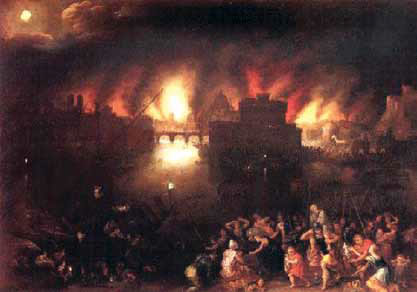The Empire, Like Zeus, Wants To Depopulate--
Not Confront Rivals
by Nancy B. Spannaus
January 2014
 Prince Philip of the U.K. |

Queen Elizabeth II of the U.K. |
The line is pervasive today. From those pushing war against China, the argument is that the U.S. has to confront an emerging rival, who will "inevitably" challenge it militarily. From those seeking to stop war, such as Chairman of the Joint Chiefs of Staff Martin Dempsey, the argument is to avoid the "Thucydides trap," the Greek historian's famous argument that Sparta went to war against Athens because it feared its becoming a rival power.
In fact, the imperial drive for war today, as Lyndon LaRouche has insisted, has nothing to do with fear of aggressive rivals, but the oligarchical desire to depopulate the planet.
Just as Zeus, according to Prometheus, was determined to "bring the whole [human--ed.] race to an end and create a new one in its place," the oligarchy is determined to wipe out the greater part of the human population. It is following a pattern established most notably in the Greek destruction of Troy.
In his EIR article "War, the Oligarchy, and the Ancient Myth of Overpopulation," Theodore J. Andromidas documented this pattern in gory detail. The full article can be found in the May 3, 2013 edition of EIR Online, but we excerpt the relevant sections on Troy here:
Throughout the Iliad, Homer provides us with an accurate assessment of the sentiments of the oligarchical system toward humanity in general, an attitude best expressed by the god Apollo when, in the Iliad, he describes humanity as "a pack of miserable mortals, who come out like leaves in Summer, and eat the fruit of the field, and presently fall lifeless to the ground." Homer makes it quite clear that this war, in accordance with the wishes of the gods, is a war of genocide.
In the Iliad, Agamemnon tells his brother Menelaus, “We are not going to leave a single one of them [the Trojans] alive. . .” Shown: “The Burning of Troy,” by Jan Bruegel the Elder (1621).In Book IV, Agamemnon rouses the spirits of his disheartened brother, when he says: "My dear Menelaus ... we are not going to leave a single one of them alive, down to the babies in their mothers' wombs -- not even they must live. The whole people must be wiped out of existence, and none be left to think of them and shed a tear."
One epic poem of the Trojan War, largely forgotten today, but well-known in the 7th Century B.C., was the Cypria, written for the first Olympiad in 776-72 B.C. According to ancient authorities, Stasinos of Cyprus, a semi-legendary early Greek poet, authored an 11-book epic cycle, narrating the history of the Trojan War. Some ancient historians have ascribed it to Homer himself, who was said to have written it on the occasion of his daughter's marriage to Stasinos, but only fragments of the epic remain. The Cypria presupposes an acquaintance with the events of the Iliad, confining itself to the events leading up to the Trojan War. Certainly, Stasinos was well known in the ancient Greek world, for Plato puts quotes from Stasinos's works in the mouth of Socrates, in his Euthyphro dialoque.
The Cypria begins with the first cause of the war. Zeus, as an ancient precursor to today's 'Green Movement,' desires to relieve the overburdened Earth of carrying too many people. In the third fragment of the Cypria we learn that:
There was a time when the countless tribes of men, though wide-dispersed, oppressed the surface of the deep-bosomed Earth, and Zeus saw it and had pity, and in his wise heart resolved to relieve the all-nurturing Earth of men, by causing the great struggle of the Ilian war, that the load of death might empty the world. And so the heroes were slain in Troy, and the plan of Zeus came to pass.
It seems that this was not an uncommon theme in narration of the Trojan War. Three hundred years later, the Greek tragedian Euripides emphasizes again that the gods' chosen method for decreasing 'excess' population was war. In the Orestian tragedy, Orestes, son of Agamemnon, executes his mother for murdering his father. Just as the concluding scene is about to erupt into a frenzy of vengeful bloodshed, Apollo arrives to take Helen to live with the gods. He tells Menelaus:
So choose another wife, Menelaus, and take her home. The gods used this one's outstanding loveliness to bring Greeks and Phrygians together and cause a slaughter, so they might stop the overwhelming crowds of mortal men destroying the earth. So much for Helen.
* * *
To get an idea of the devastation, note that, according to the Ancient History Encyclopedia, the Troy destroyed in the Trojan war sung of by Homer was thought to have as many as 10,000 people. The Greek aggressors slaughtered all the men and boys, and enslaved the women. The city was levelled to the ground.

